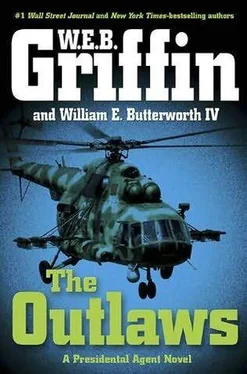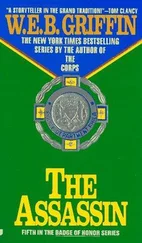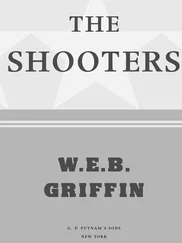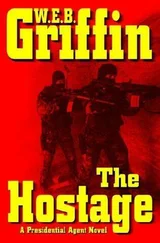W Griffin - The outlaws
Здесь есть возможность читать онлайн «W Griffin - The outlaws» весь текст электронной книги совершенно бесплатно (целиком полную версию без сокращений). В некоторых случаях можно слушать аудио, скачать через торрент в формате fb2 и присутствует краткое содержание. Жанр: Триллер, на английском языке. Описание произведения, (предисловие) а так же отзывы посетителей доступны на портале библиотеки ЛибКат.
- Название:The outlaws
- Автор:
- Жанр:
- Год:неизвестен
- ISBN:нет данных
- Рейтинг книги:3 / 5. Голосов: 1
-
Избранное:Добавить в избранное
- Отзывы:
-
Ваша оценка:
- 60
- 1
- 2
- 3
- 4
- 5
The outlaws: краткое содержание, описание и аннотация
Предлагаем к чтению аннотацию, описание, краткое содержание или предисловие (зависит от того, что написал сам автор книги «The outlaws»). Если вы не нашли необходимую информацию о книге — напишите в комментариях, мы постараемся отыскать её.
The outlaws — читать онлайн бесплатно полную книгу (весь текст) целиком
Ниже представлен текст книги, разбитый по страницам. Система сохранения места последней прочитанной страницы, позволяет с удобством читать онлайн бесплатно книгу «The outlaws», без необходимости каждый раз заново искать на чём Вы остановились. Поставьте закладку, и сможете в любой момент перейти на страницу, на которой закончили чтение.
Интервал:
Закладка:
"How can it be killed?"
"My initial tests suggest the only way it can be killed is by thorough incineration at temperatures over a thousand degrees Centigrade. The residue, I am coming to believe, may then be encased in a nonporous container. Glass or some type of ceramic would work, I think, but there one would have the risk of the glass or ceramic breaking. Aluminum seems to form a satisfactory barrier. As a matter of fact, I used simple aluminum foil to isolate the material I brought out of the Congo; I had nothing else. And the Congo-X material that was sent to my laboratory today was wrapped in aluminum foil."
"Like a Christmas turkey?" President Clendennen asked.
"More like, I would say, Mr. President, cold cuts from a delicatessen. Very carefully, so there was little or no risk that the foil could be torn. The people who sent me the Congo-X obviously seem to know what they are doing."
"And who, would you guess, Colonel, were the people who sent you the Congo-X? More importantly, why do you think they did?"
"I've given that some thought, Mr. President," Hamilton said.
"And?"
The tone of impatience in the President's voice was clearly evident.
"They wanted us to know that the attack on the Fish Farm was unsuccessful," Hamilton said. "That they have Congo-X. We have to presume they know a great deal more about it than I have been able to learn in the few days I've had to work with it. They are making the point that the threat which existed before we learned of the Fish Farm and attempted to destroy it exists now."
"Why wouldn't they try to keep that secret, so they would have the element of surprise if they decide to use Congo-X on us?"
"That's the question to which I have given the most thought," Hamilton said. "It was self-evident that they wanted us to know we failed, and that they have Congo-X. The question is, why?"
"That's the question I asked, Colonel," the President said.
"I think they want something from us," Hamilton said, very seriously.
"And what, Colonel, do you think that might be?"
"I have no idea," Hamilton said. "Absolutely no idea."
President Clendennen looked around the Oval Office.
The Honorable Natalie Cohen, secretary of State; Ambassador Charles M. Montvale, director of National Intelligence; the Honorable John J. Powell, director of the Central Intelligence Agency; and the Honorable Mason Andrews, assistant secretary of the Department of Homeland Security, were sitting on the chairs and couches around a glass-topped coffee table. Not one had said a word during the "bad news" exchange between the President and Colonel Hamilton.
"Odd," Clendennen said to them. "I would have bet two bits to a doughnut that y'all would be falling all over yourselves to offer sage political advice and profound philosophical opinions concerning our little dilemma."
No one responded.
The President grunted, then announced: "One, I believe everything Colonel Hamilton has told us about this terrible substance. Two, we are not about to react to this threat the way my predecessor did. We bombed everything in a twenty-square-mile area of the Congo into small pieces and then incinerated the pieces. Since somebody still has enough of a supply of this stuff to share it with us, I think we have to concede that the only thing that bombing did was bring us within a cat's whisker of a nuclear exchange and give those people who don't like us much anyway good reason to like us even less.
"So what we're going to do now is proceed very carefully and only when we're absolutely sure of what we're doing. I will now entertain suggestions as to how we can do this." He paused, and then went on: "You first, Andrews."
There was no immediate reply.
"Well?" the President pursued, not very pleasantly.
"Mr. President," Mason Andrews said. "In addition to the obvious, I think we have-"
"What's the obvious?" the President interrupted.
"Well, we have to decide whether we are going to raise the threat level to orange, or perhaps red. I tend to think the latter."
"Not 'we have to decide,'" the President said. "I have to decide. Somebody tell me why raising the threat level from yellow wouldn't cause more problems than it would solve."
He looked around the Oval Office. "Comments? Anyone?"
There were none.
"What else is obvious?" the President demanded.
"Well, sir, we have to find out who sent this stuff to the colonel," Andrews said.
"First of all, it wasn't sent to Colonel Hamilton," the President said. "It was sent to us. The government. Me, as President. Not to Colonel Hamilton. It was sent through him because these bastards somehow knew he was the only man around who would know what it was. And they knew he would tell me. Secondly, at this moment-and I realize this could change in the blink of an eye-there is no immediate threat. If these people wanted to start killing Americans, they would have already done so."
"Mr. President," Ambassador Montvale offered, "their intention might be to cause panic."
Clendennen nodded.
"That's what I'm thinking. And I'm not going to give them that. That's why the threat level stays at yellow."
The President was then silent, visibly in thought, for a long moment. Then he cocked his head to one side. A smile crossed his lips, as if to signify he was pleased with himself.
He said, "Fully aware that this is politically incorrect, I have just profiled the bastards who sent Colonel Hamilton the Congo-X. I have decided that the Congo-X was sent to the colonel by a foreign power, or at the direction of a foreign power or powers. And not, for example, by the Rotary Club of Enterprise, Alabama, or any sister or brother organization to which the Rotarians may be connected, however remotely."
Ambassador Montvale's eyes widened, and for a moment he seemed to be on the edge of saying something. In the end, he remained silent.
"The ramifications of this decision," the President went on, "are that finding out who these bastards are-and, it is to be hoped, what the hell this is all about-falls into what I think of as the CIA's area of responsibility, rather than that of the FBI or the Department of Homeland Security."
He looked at DCI Powell.
"Those are your marching orders, Jack. Get onto it. I will have the attorney general direct the FBI to assist you in any area in which you need help."
"Mr. President, with all respect," Mason Andrews said, "this crime, this threat to American security, took place on American soil! This situation is clearly within the purview of Homeland Sec-"
"What situation, Andrews?" the President interrupted him. "What threat to American security? No one has been hurt. What's happened is that a securely wrapped package of what the colonel has determined to be what he calls Congo-X was sent to Colonel Hamilton in a container clearly marked as a biological hazard.
"That's all. There has been no damage to anyone. Not even a threat of causing damage. If we had these people in handcuffs, there's nothing we could do to them because they haven't broken any laws that I can think of.
"What we are not, repeat not, going to do is go off half-cocked. For example, we are not going to resurrect my predecessor's private James Bond-what's his name? Costello?-and his band of assassins and give them carte blanche to roam the world to kill people. Or anything like that.
"What we are going to do is have Montvale-he is the director of National Intelligence-very quietly try to find out who the hell these bastards are and what they want. I think Colonel Hamilton is right about that. They want something. That means they will probably-almost certainly-contact Colonel Hamilton again.
"What that means, since we can't afford to have anything happen to him, is that Homeland Security is going to wrap the colonel in a Secret Service security blanket at least as thick as the one around me. That's your role in this, Andrews. That's your only role.
Читать дальшеИнтервал:
Закладка:
Похожие книги на «The outlaws»
Представляем Вашему вниманию похожие книги на «The outlaws» списком для выбора. Мы отобрали схожую по названию и смыслу литературу в надежде предоставить читателям больше вариантов отыскать новые, интересные, ещё непрочитанные произведения.
Обсуждение, отзывы о книге «The outlaws» и просто собственные мнения читателей. Оставьте ваши комментарии, напишите, что Вы думаете о произведении, его смысле или главных героях. Укажите что конкретно понравилось, а что нет, и почему Вы так считаете.











